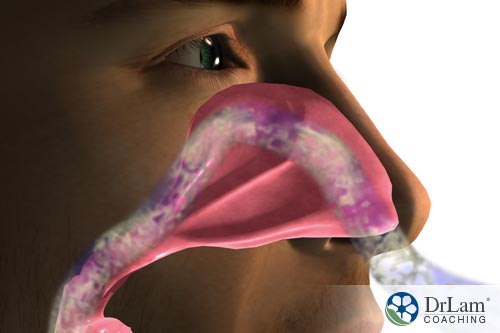 Sinus drainage is your body’s natural way of clearing out your sinuses. The sinus chambers are located behind your forehead, eyes, and cheeks. They help with speech and are connected to your nasal cavity. The mucus produced inside your sinuses drains through openings in your nose and the back of your throat. Sinus drainage keeps your nose moist and free of dust and gets rid of any bacteria and germs.
Sinus drainage is your body’s natural way of clearing out your sinuses. The sinus chambers are located behind your forehead, eyes, and cheeks. They help with speech and are connected to your nasal cavity. The mucus produced inside your sinuses drains through openings in your nose and the back of your throat. Sinus drainage keeps your nose moist and free of dust and gets rid of any bacteria and germs.
The mucus that reaches your nose is usually removed by the simply blowing it. And any mucus that heads down the throat typically goes unnoticed because it mixes with saliva as it drips down your throat and is swallowed.
Sometimes, however, conditions within the sinuses do not promote healthy sinus drainage. This can lead to a set of symptoms caused by the underlying condition itself or as a result of your sinuses not functioning optimally.
Sinus drainage becomes noticeable when your body produces more mucus than usual or when the mucus becomes thick and causes irritation. Common causes of incorrect sinus drainage include:
Other times, incorrect sinus drainage is not caused by mucus production issues, but by other factors that prevent mucus from being cleared away. This can result in the build-up of fluid in your throat and symptoms like coughing, which are common with aging or if you suffer from gastroesophageal reflux disease.
If you have asthma or nasal passage abnormalities, you may be at a higher risk of developing sinus drainage issues and more susceptible to sinusitis.
If excess mucus drains through your nose, you may experience a ‘runny nose’ or the need to blow your nose more often. On the other hand, excess mucus that drains down the throat is referred to as post-nasal drip. With the latter, you may find yourself constantly trying to clear your throat or coughing to get rid of the mucus. You may also notice the cough getting worse at night, especially while you’re asleep.
Further complications of incorrect sinus drainage and post-nasal drip include pneumonia and bronchitis. This is because when you’re lying on your back mucus from post-nasal drip seeps around your epiglottis—the flap in your throat that prevents food from entering your windpipe and lungs—allowing not only mucus into your lungs, but bacteria as well. A hoarse, sore, or scratchy throat are common.
Sometimes the excess fluid runs into your eustachian tube, the tube that connects your throat and middle ear. This can cause painful ear infections, although this is more common in children than adults.
You could also develop a sinus infection if your sinuses become clogged due to incorrect sinus drainage. Sinusitis is caused by an inflammation of your sinuses and associated symptoms include:
In some cases, incorrect sinus drainage and its various symptoms can lead to further complications, such as
 Respiratory conditions caused by incorrect sinus drainage such as sinusitis can lead to further infections and inflammation. It can also adversely affect your adrenal glands. If you suffer from Adrenal Fatigue, problems with sinus drainage can make your symptoms worse and in certain cases, your entire system may crash.
Respiratory conditions caused by incorrect sinus drainage such as sinusitis can lead to further infections and inflammation. It can also adversely affect your adrenal glands. If you suffer from Adrenal Fatigue, problems with sinus drainage can make your symptoms worse and in certain cases, your entire system may crash.
This leads us to the question of why?
Inflammation is a form of stress. Your brain perceives stress as an attack. As a result, the hypothalamic-pituitary-adrenal (HPA) axis jumps into action sending out chemical messages to alert the rest of your body about the attack. This natural reaction is referred to as the NeuroEndoMetabolic (NEM) Stress Response. The response is automatic and there is no way to stop it from happening. The cascade of events prepares your body to deal with the problem, either by running away or facing the threat head-on.
The most important byproducts of the NEM Stress Response are cortisol and epinephrine, which are both produced by the adrenal glands. These two stress hormones put your body on high alert—your heart pumps faster, your respiratory rate increases, your blood sugar levels rise to make energy available so you can react, and all the functions of your body considered unnecessary are paused or slowed down to ensure your immediate survival. This is just your body’s natural survival instinct kicking in and in the short-term won’t cause any damage. However, persistent stress for a long period of time can have devastating consequences. Chronic inflammation is one of the situations that can cause chronic stress.
Inflammation is your body trying to defend itself against a threat, e.g., toxins or invading pathogens. By eliminating the threat, your body can begin to repair itself. The swelling and pain you feel when inflammation occurs in the sinuses are caused by the buildup of fluid which places pressure on the surrounding nerves. At the same time, molecular mediators—the specific molecules that fight inflammation—trigger pain, thereby adding to the discomfort in your sinuses.
While inflammation is a natural, necessary process designed to help your body heal, uncontrolled inflammation can lead to chronic inflammation and exacerbate existing problems. With chronic inflammation, the inflammatory response is constantly triggered, and your body is unable to heal itself as it normally would. This is largely due to cortisol.
One of the functions of cortisol is to reduce inflammation. Now, this may sound like is a good thing, but remember, if inflammation persists, cortisol’s continuous efforts to reduce inflammation may suppress your immune system. A compromised immune system combined with chronic inflammation can lead to a series of seemingly unrelated health problems, including increased susceptibility to respiratory tract issues, certain cancers, food allergies, autoimmune disorders, and various gastrointestinal issues like irritable bowel syndrome (IBS).
Of course, the stage of Adrenal Fatigue you’re in will also determine how susceptible your body is to inflammation. Your body may not cope as well during the later stages of Adrenal Fatigue, therefore, inflammation could result in adrenal crashes.
It’s frightening to think that the issues mentioned above could be the result of something as innocuous-sounding as a chronic sinus drainage problem.
Conventional remedies for dealing with sinus drainage issues include the use of medications aimed at relieving the discomfort, antihistamines if allergies are the cause, decongestants to thin the mucus and help it drain more easily, and nasal decongestants. It is incredibly important to address sinus drainage issues if you’re suffering from Adrenal Fatigue because if not dealt with, they can lead to chronic inflammation. More importantly, you need to address the underlying problem causing the sinus drainage issues rather than just treating the symptoms.
The problem with conventional remedies is that they usually only provide temporary relief from the symptoms and don’t address the underlying cause. Some of these may also be addictive. In the longer term, natural treatments or home remedies provide a safer option.
Natural remedies that promote sinus drainage include:

 There are many things you can do at home to manage sinus drainage issues. It’s best to stay on top of the problem and start home remedies as soon as possible. However, if symptoms persist, it may be a good idea to seek the advice of a trained professional. If not addressed properly, sinus drainage issues may lead to other more severe conditions with devastating effects on your overall health.
There are many things you can do at home to manage sinus drainage issues. It’s best to stay on top of the problem and start home remedies as soon as possible. However, if symptoms persist, it may be a good idea to seek the advice of a trained professional. If not addressed properly, sinus drainage issues may lead to other more severe conditions with devastating effects on your overall health.
© Copyright 2019 Michael Lam, M.D. All Rights Reserved.
Sinus drainage may very well be connected to bronchitis. This is because when sinus drainage is compromised, thick mucus can travel around the epiglottis while you’re lying down and enter the bronchial tubes and lungs. This can result in infections such as bronchitis and pneumonia.
